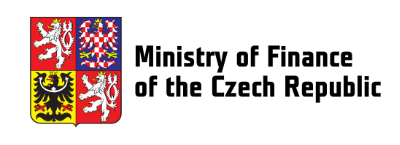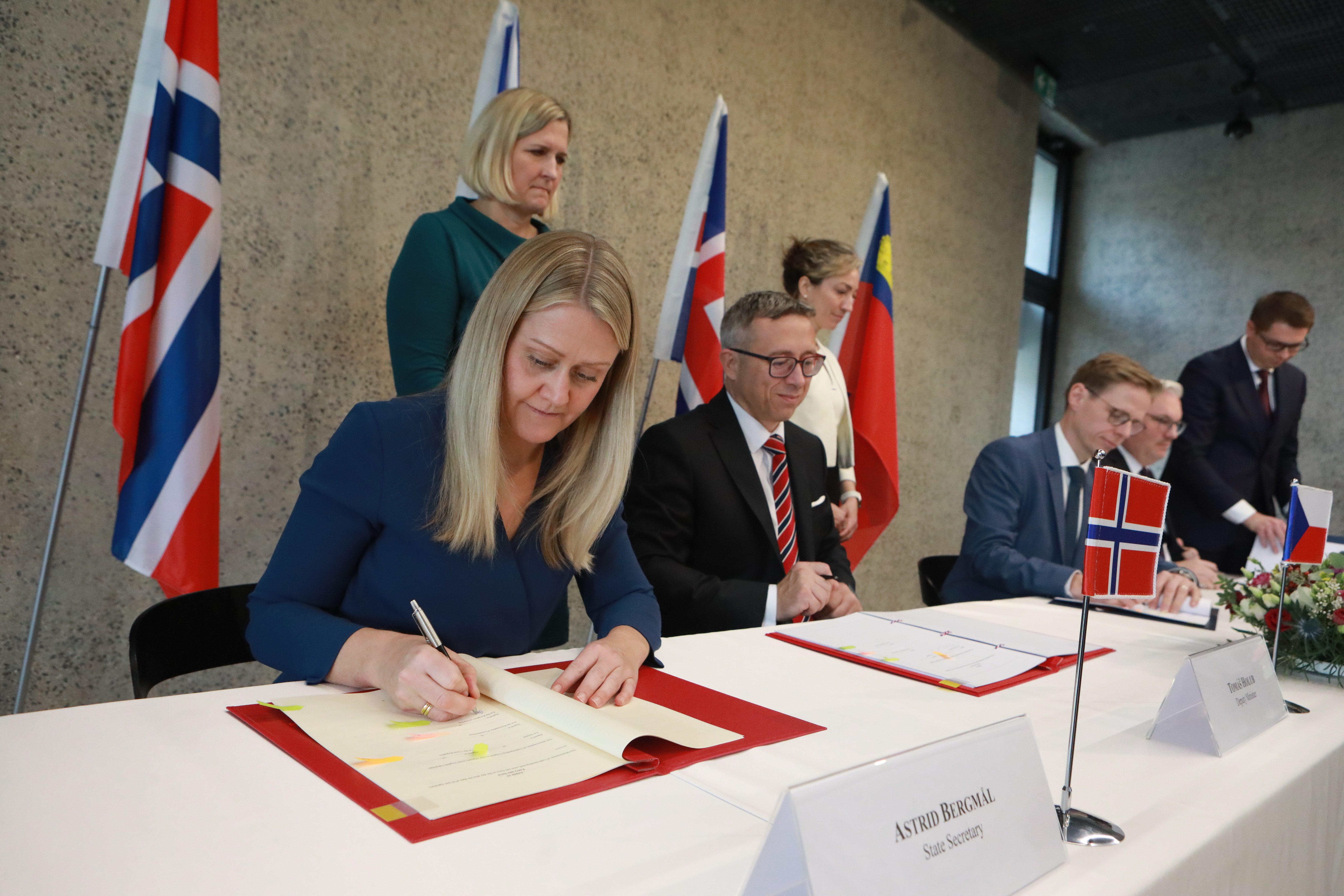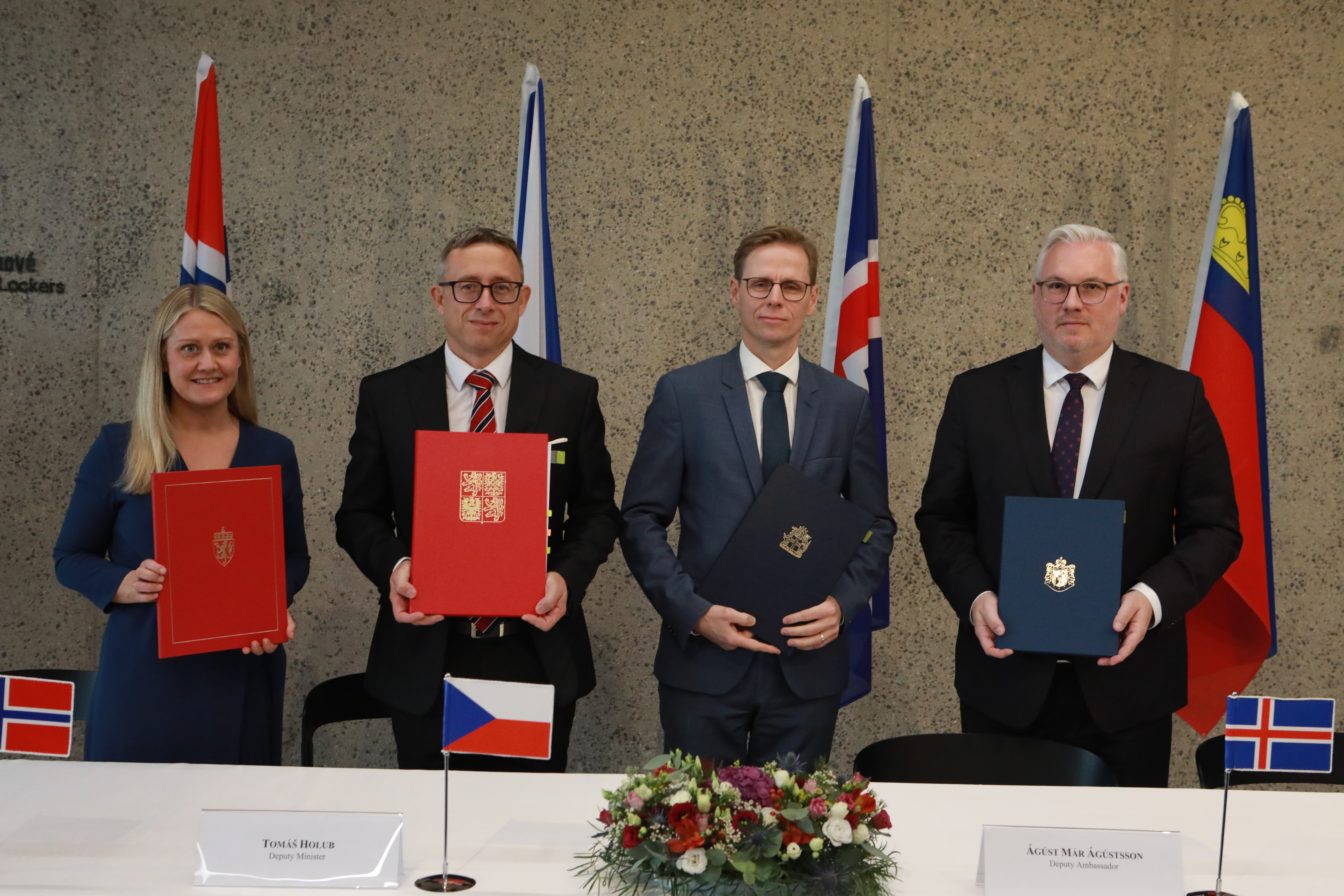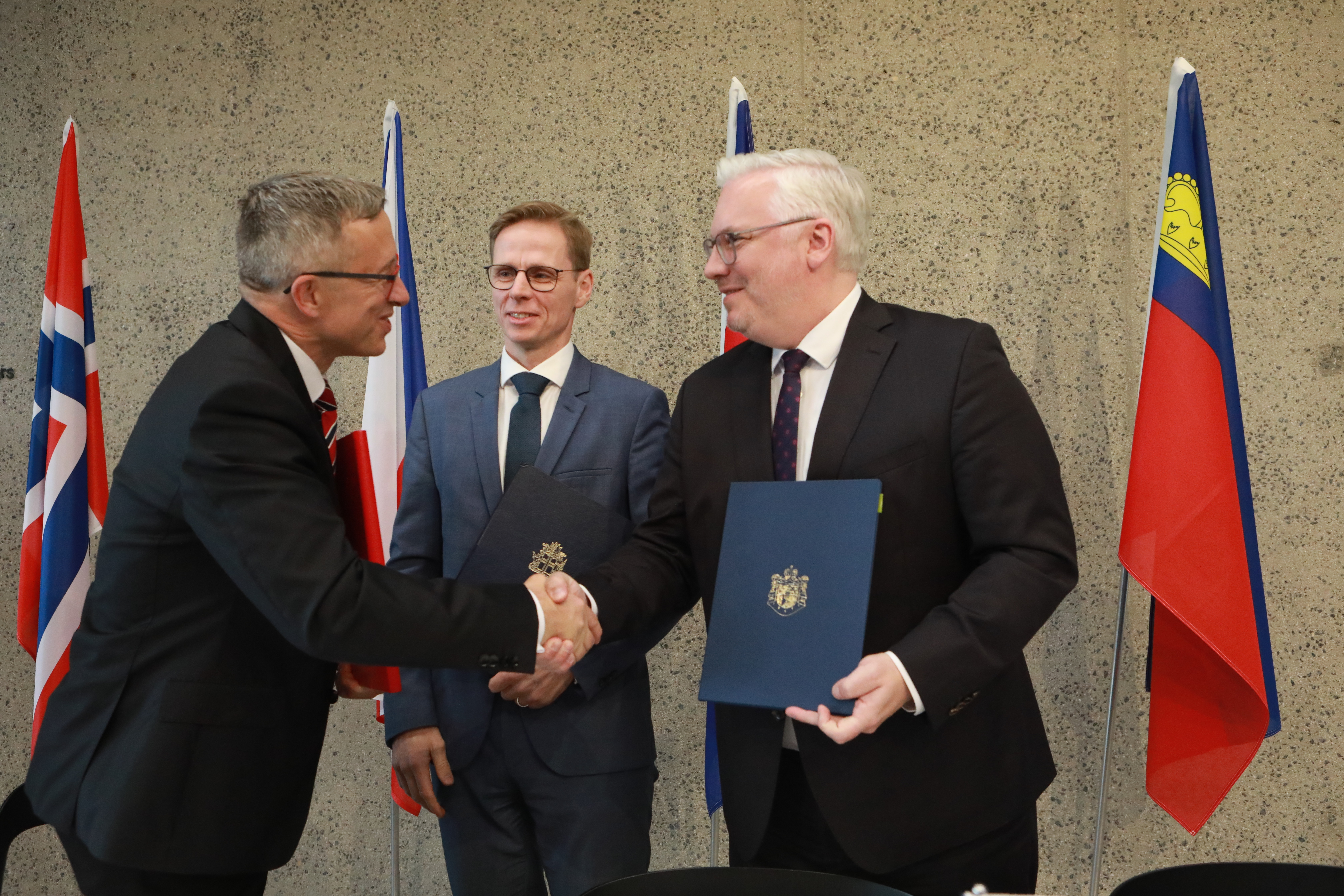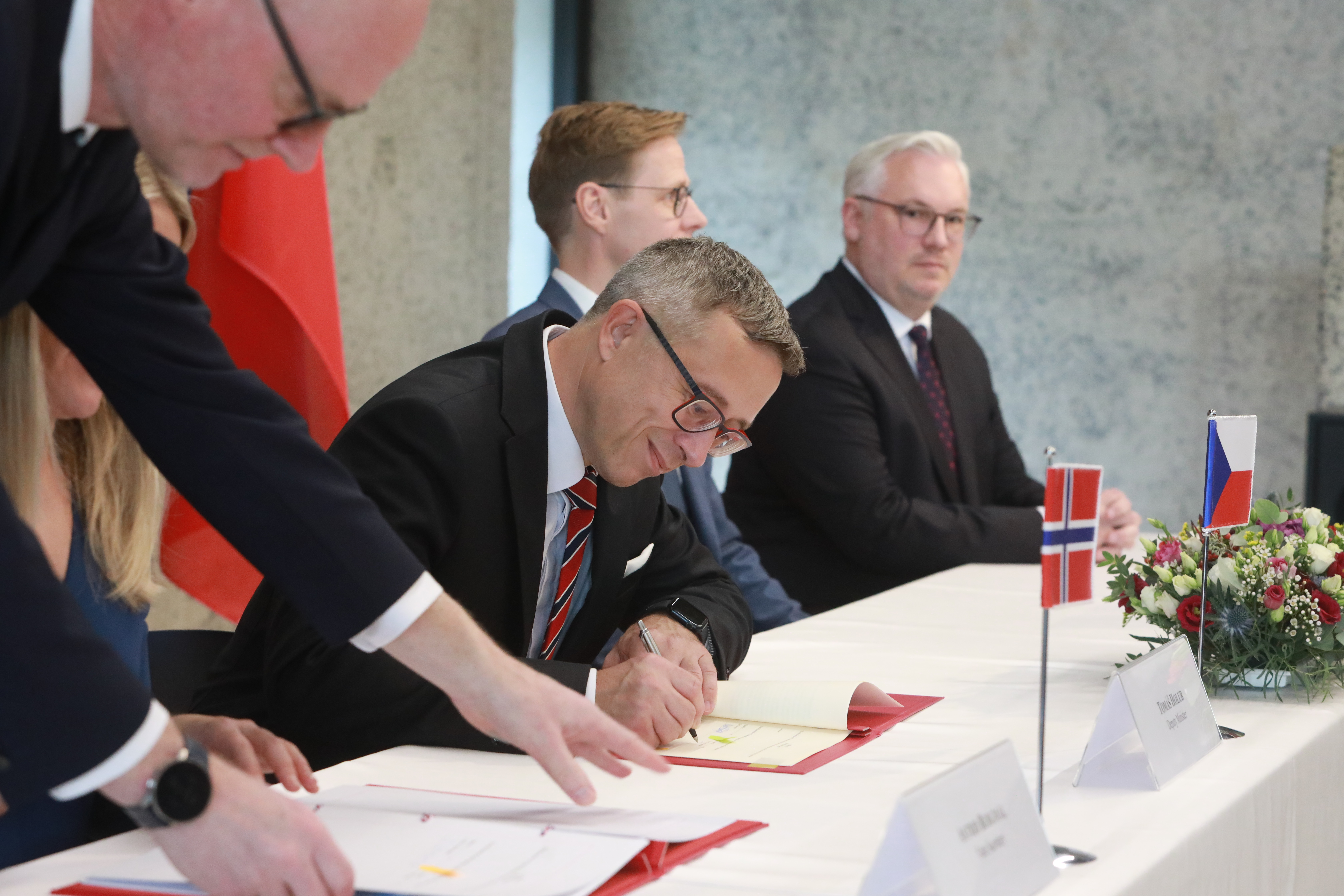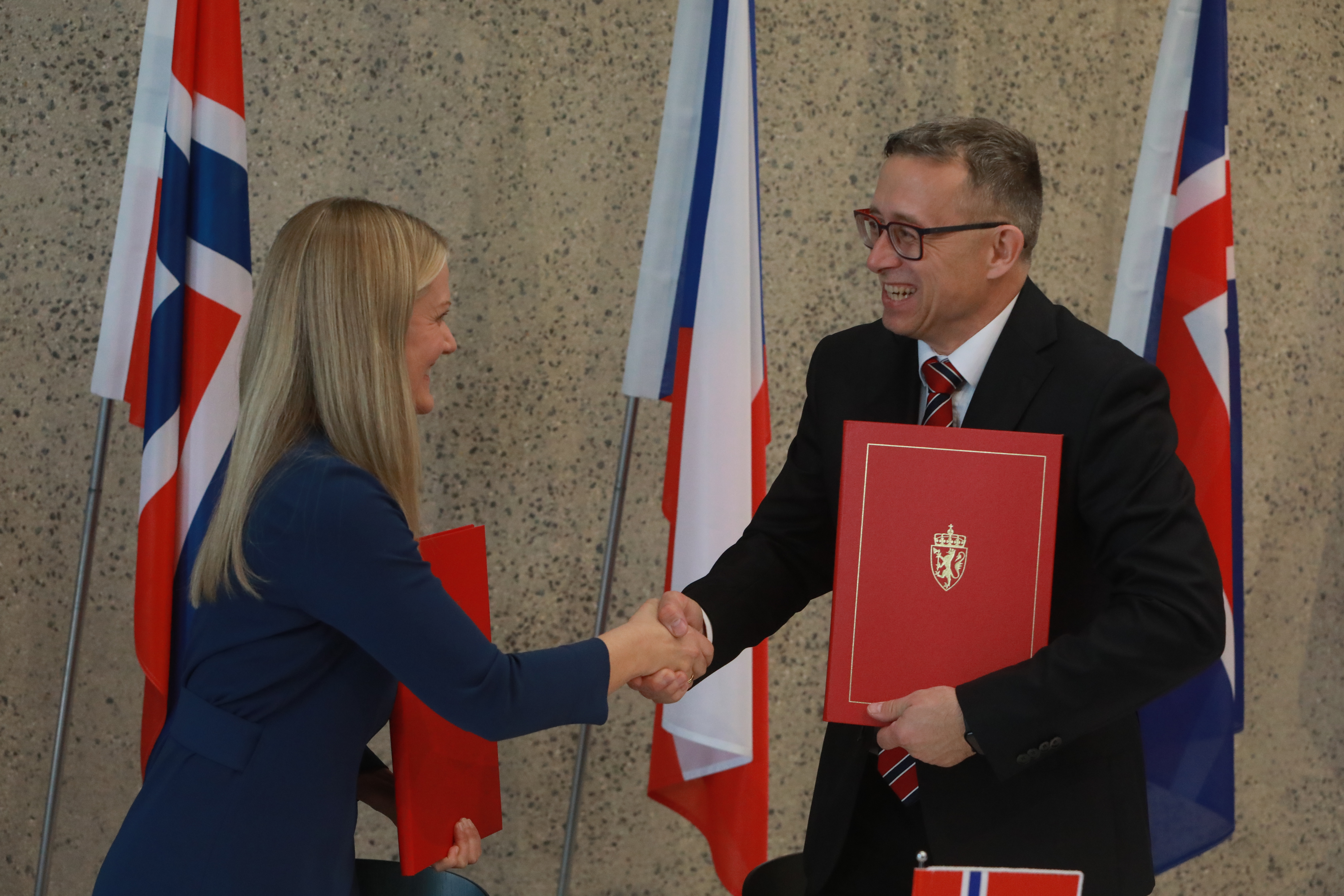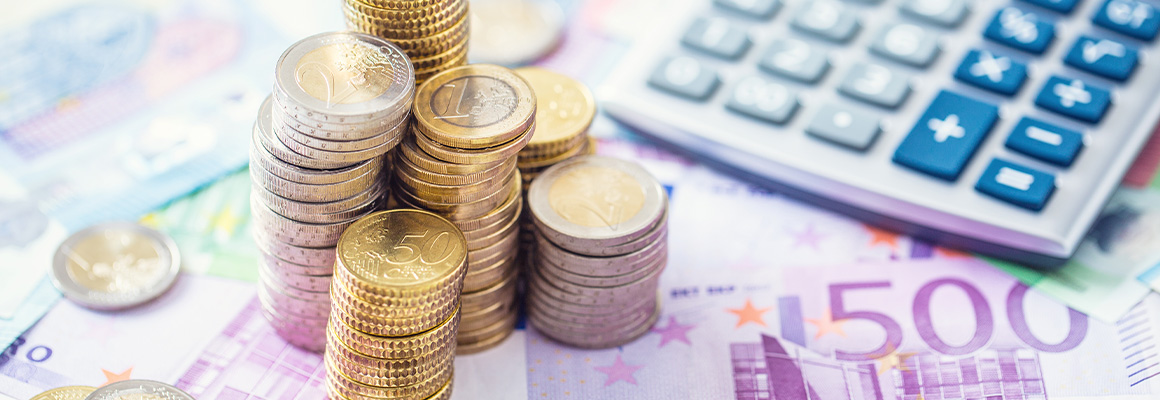
The fourth period of the EEA and Norway Grants begins, with the Czech Republic signing Memoranda of Understanding
The Memoranda were signed by Astrid Bergmål, State Secretary for Minister of Foreign Affairs of Norway, Ágúst Már Ágústsson, Deputy Ambassador of Iceland to the Czech Republic, H.E. Simon Biedermann, Ambassador of Liechtenstein to the Czech Republic, and Tomáš Holub, Deputy Minister of Finance of the Czech Republic. The signed documents set out the basic conditions for the implementation of the European Economic Area and Norway Grants in the Czech Republic and define the mutually agreed programme areas, their focus and the amount of support.
„Our cooperation with partner countries within the EEA and Norway Grants has clearly proven its worth. It is great news for everyone involved that we have agreed to continue it,“ said Deputy Minister Tomáš Holub on the signing of the memoranda. „Now comes the time to negotiate and set the specific focus of all the programmes and specify the parameters of the individual calls for proposals through which successful applicants from the public and private sector will subsequently receive funding for their projects,“ Deputy Minister Holub described the work process for the coming months.
„The EEA Grants represent a cornerstone of Iceland’s partnership with the Czech Republic, fostering cooperation built on shared values and mutual benefit. Over the years, our collaboration has produced meaningful results across diverse fields, strengthening the ties between our institutions and peoples. As we enter the new funding period, Iceland remains firmly committed to further deepening this partnership to address common challenges and promote sustainable growth,“ stated Deputy Ambassador Ágúst Már Ágústsson.
„In recent years, the EEA Grants have realized projects with a broad and lasting impact across the Czech Republic. With this agreement, we aim to build on these achievements. We are particularly pleased that the EEA Grants also contribute to preserving the Czech Republic’s remarkable cultural heritage — a heritage including centuries of shared history and representing an enduring part of Europe’s rich cultural landscape,” commented Ambassador Simon Biedermann upon signing the memoranda.
The Czech Republic will receive over EUR 225 million (approximately CZK 5.5 billion) in the new programming period. The first calls for proposals are expected to be announced at the turn of 2026 and 2027 at the earliest. As in the previous period, the emphasis will be put on strengthening bilateral relations between the Czech Republic and the donor states.
Support will be aimed towards projects focusing primarily cooperation in culture and cultural heritage, research and Innovation, support for green transformation, public health, education and the inclusion and empowerment of Roma. Part of the funds will also be used for projects related to the challenges that have arisen as a result of the invasion of Ukraine. The new period also brings opportunities for bilateral projects under the Bilateral Cooperation Fund. Part of the funds will also go to the non-profit sector, mainly through the Civil Society Fund.
During the previous, third period of the EEA and Norway Grants (2014-2021), a total of 848 beneficial projects in various areas were supported. More than 300 projects were implemented with partners from Norway, Iceland and Liechtenstein, representing almost 40% of all supported projects.
The Czech Republic became a beneficiary of the EEA and Norway Grants in 2004 when it joined the EU. In total it has received more than CZK 11 billion and supported over 1,900 projects to date.
Through the EEA and Norway grants, Norway, Iceland and Liechtenstein contribute to reducing economic and social disparities within the European Economic Area (EEA) and to strengthening cooperation with European countries. Financial support is provided to 15 countries in Central, Eastern and Southern Europe. This measure is enshrined in the Agreement on the European Economic Area which allows the countries of the European Free Trade Association (EFTA) – Norway, Iceland and Liechtenstein – access to the EU single market. The EEA Funds have been in operation since 1994 and Norwegian Funds since 2004. The EEA and Norway Funds put great emphasis on sharing and exchanging experiences between donor and recipient countries. This aspect distinguishes them from EU funds.
Examples of successful projects from previous periods:
Revitalisation of the Barbora Ironworks in Jince – The Barbora Ironworks in Jince, an important technical monument to 19th-century iron production, underwent extensive reconstruction, which preserved its historical appearance and opened it to the public as an attractive cultural and educational site. The project has contributed to the revitalisation of regional heritage and the strengthening of tourism in the area.
Project REPLACE – Greenery Instead of Concrete transforms concrete areas in Ostrava into attractive green spaces which can regulate the surrounding temperature, improve air quality and create a more pleasant environment for citizens and visitors to the city. The project builds on the Healthy City priority enshrined in Ostrava’s Strategic Plan.
PROFiBONE – A Czech-Icelandic project is revolutionising the field of 3D-printed bone implants, which are designed to fit patients precisely and promote faster bone healing. The groundbreaking material is being developed by scientist from CEITEC VUT Beno in collaboration with the Faculty of Medicine at Charles University Pilsen and Icelandic partners. They use it to print implants that copy the patient’s specific bone defect and can be enriched with bioactive substances to support regeneration. In addition, the team has already filed an international patent application (PCT) – the first step towards obtaining a European patent for this unique technology.
The Antibiotic Resistance Prevention Project (antibiotickarezistence.cz) has improved the Czech population’s knowledge of antibiotics and responsible behaviour towards them. The success of the campaign, which aimed to highlight the fact that it is literally vital to preserve antibiotics as an effective weapon for the future, is revealed by the results of a joint survey conducted by Engage Hill and Remmark in the spring of 2023.
Connected by glass! The project brought together local glassmakers, a museum, a glassmaking school, the Roma community, the public, local institutions and Norwegian glassmaking community. At the same time, it supported the glassmaking tradition, which is important not only for the Železný Brod region, but for the whole of the Czech Republic.
Memorial to the Holocaust of Roma and Sinti in Lety near Písek. The opening of this memorial represents a fundamental step towards recognising and commemorating the history of the Roma and Sinti communities, shedding light on dark chapters of history, particularly from the period of the Protectorate of Bohemia and Moravia.
The 50% #StopNenavisti Forum project. Raising awareness about various forms of violence against publicly active women drew attention to an issue that had been neglected in Czech society. Women are exposed to many times more attacks on their person in public spaces than men.
The Modernisation of the Police Training Centre project provides space for the education of the Czech Police. The most modern training centre of the Czech Police was built on the outskirts of Kutná Hora in Central Bohemia. Thanks to the EEA and Norway Grants, abandoned barracks have been transformed into a state-of-the-art facility used not only for training police officers, but also other armed forces. Modern teaching facilities, an outdoor training ground that meets ANTO standards, and openness to external institutions make this centre unique in the Czech Republic.
For more information on the EEA and Norway Grants, visit www.eeagrants.cz/en.
